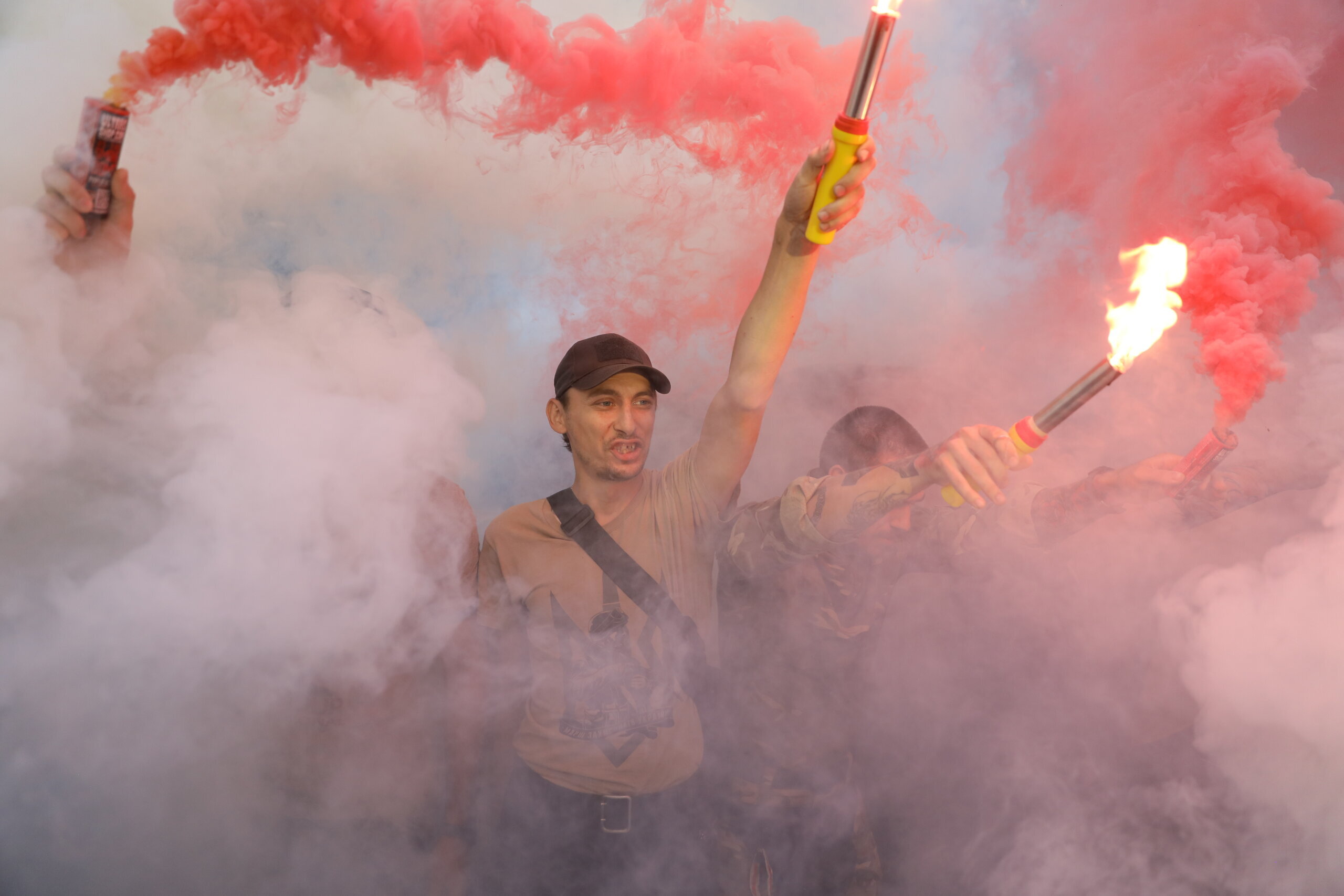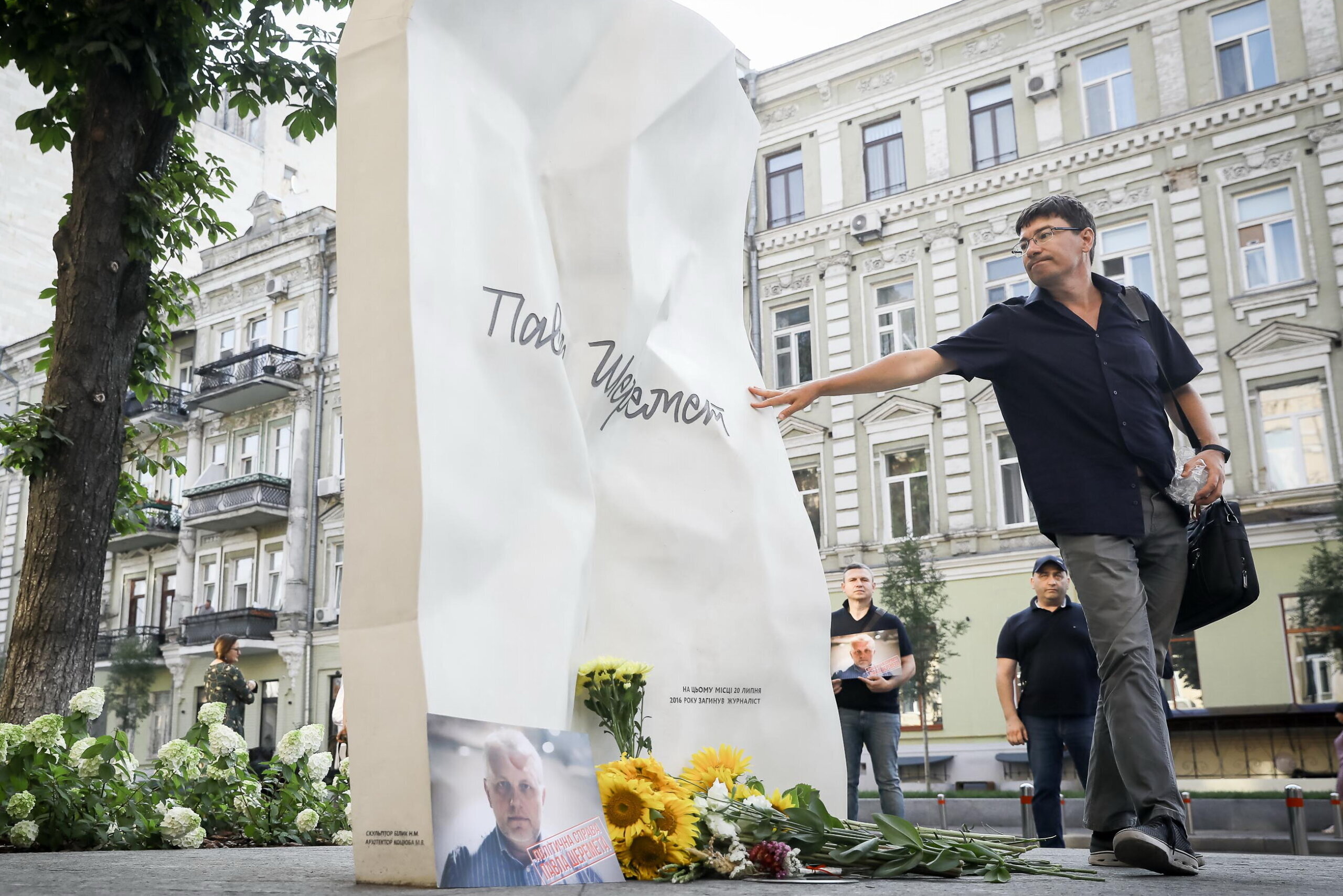The hanging of a prominent Belarusian activist Vitaliy Shyshov in a Kyiv park on Aug. 3 sparked outrage far beyond the country’s borders.
President Volodymyr Zelensky was forced to respond to Shyshov’s death, promising better security to Belarusian activists seeking refuge in Ukraine.
Despite Zelensky’s words, the death of yet another activist showed that Ukraine isn’t safe.
The death of Shyshov, head of the Belarus House in Ukraine, is the latest event in a long sequence of casualties among dissidents fleeing Vladimir Putin’s Russia and Alexander Lukashenko’s Belarus.
Belarus-born journalist Pavel Sheremet, a prominent critic of Lukashenko, was blown up in his car in downtown Kyiv in July 2016. Five years on, the murder remains unsolved.
In March 2017, former Russian lawmaker Denis Voronenkov was shot dead in downtown Kyiv. In October of the same year, Amina Okueva, a high-profile Chechen activist and war veteran, was killed 10 kilometers southwest of Kyiv.
“There have been murders, kidnappings and all sorts of other nefarious things going on there,” businessman and human rights activist William Browder told the Kyiv Post.
“It’s clear that Ukraine is not safe for the enemies of the Putin or Lukashenko regime,” said Browder, one of the Kremlin’s most prominent critics and author of “Red Notice: How I became Putin’s Enemy No. 1.”
Shyshov’s death
Shyshov was found hanged in a park on the outskirts of Kyiv. A day earlier, the activist left his house to go for a jog.
The authorities have launched a criminal investigation saying that they are looking into a potential murder framed as suicide.
Ihor Klymenko, head of the National Police, said during a press briefing that Shyshov had other injuries. “He had certain scratches, torn skin on his nose, on his left knee and his chest,” said Klymenko.
Shyshov fled Belarus in the fall of 2020 after participating in countrywide protests against Lukashenko.
The 2020 August presidential elections in Belarus were allegedly rigged leading to protests drawing hundreds of thousands of Belarusians into the streets. Soon, prominent activists were jailed, tortured or forced out of the country.
In Kyiv, Shyshov became one of the founders of the Belarus House in Ukraine, a nongovernmental organization established to help Belarusians who have fled repressions in their home country.
According to the organization, the authorities were previously informed of Shyshov being watched.
Belarus House in Ukraine deputy head Rodion Batulin said that Shyshov and his girlfriend were followed by strangers and were watched from cars parked near their residence on several occasions.
According to a Belarus House statement, “there is no doubt that this is a planned operation of the Belarus security forces to liquidate a person truly dangerous for the Belarusian regime.”

Activists burn flares at a rally next to the Belarusian Embassy in Ukraine to commemorate Vitaliy Shyshov, a Belarusian who was found hanged in a park near his home in Kyiv on Aug. 3, 2021. (Oleg Petrasiuk)
Belarus political refugee Igor Kravchenko says that after Shyshov’s death, he doesn’t feel safe in Ukraine.
“We ran from Lukashenko’s regime because we could have been imprisoned and after today it looks like here we can get killed,” Kravchenko said.
Zelensky agreed. “Every Belarusian who may be a target because of a public political position should receive special and reliable protection,” the president said.
Despite that, Shyshov’s deputy Batulin was banned from entering Ukraine by the Security Service on Aug. 4. Ukrainian media have linked Shyshov and Batulin to Ukrainian far-right movements through Belarusian Sergei Korotkikh, a fighter of Ukraine’s Azov volunteer regiment, known for his far-right views.
The Security Service of Ukraine ruled that Batulin poses a threat to national security.
Totalitarian state
Although suicide has not been ruled out, a long sled of torture, imprisonment and death among Belarusian activists have raised concerns about the potential reach of Lukashenko’s regime.
Lukashenko’s main political opponents — Viktor Babariko and Sergei Tikhanovsky — were both imprisoned before the Aug. 9, 2020, election that Lukashenko allegedly rigged in his favor. Prominent opposition leader Maria Kolesnikova was kidnapped in September and is now on trial.
On May 23, Lukashenko ordered to hijack the Ryanair passenger plane passing over Belarus en route from Athens to Vilnius with his critic, journalist Roman Protasevich on board.
Belarusian authorities falsely claimed that the passenger plane had a bomb on it. The plane was forced to turn around and land in Minsk.
Belarusian KGB agents raided the plane and arrested Protasevich and his girlfriend Sofia Sapega, a Russian national.
After spending weeks in detention, Protasevich was paraded on Belarus state television being forced to admit that Lukashenko “has balls of steel.” He is awaiting trial.
As of Aug. 5, there are 603 political prisoners in Belarus according to Vesna human rights group.
Belarus authorities aren’t slowing down.
On Aug. 1, an attempt was made to kidnap Belarus athlete Kristina Timanovskaya from the Tokyo Olympic village by people linked to Belarus authorities after she criticized the country’s sports federation. Timanovskaya was able to escape and was provided shelter by the International Olympic Committee.
On Aug. 4, Timanovskaya safely landed in Poland. She was provided a humanitarian visa.
Timanovskaya’s family has left Belarus for Ukraine, while the athlete said that she is not planning on returning home fearing imprisonment.
KGB’s hunt
While Ukraine is a convenient place to flee from neighboring Belarus, it’s not the safest.
Belarus authorities have been linked to extra-territorial murders in the past and have the capacity to do it again.
Prominent journalist Sheremet was killed in a car explosion in Kyiv on July 20, 2016. Sheremet, who fled Belarus in 1997, was a fierce critic of Lukashenko. His murder became one of the most important unsolved cases in modern Ukrainian history.

A man pays tribute to journalist Pavel Sheremet in Kyiv on July 20, 2021, on the site where Sheremet’s car exploded five years ago. (Oleg Petrasiuk)
In December 2019, Zelensky and then-Interior Minister Arsen Avakov said the case is likely solved. Three official suspects in the Sheremet case — Andriy Antonenko, Yulia Kuzmenko and Yana Dugar — were soon arrested.
However, the evidence remained thin and all three were released on house arrest. All three denied accusations, while Avakov lost his job a month after Zelensky said that “If they are proven to be not guilty, there will be a serious conversation with Avakov.”
On Jan. 4, the publication of an alleged audio recording implicating the Belarusian KGB in Sheremet’s murder.
The leaked tape was allegedly recorded on April 11, 2012, in the Minsk office of Vadym Zaitsev, then head of Belarusian KGB.
“We should take care of Sheremet, who is a massive pain in the ass,” Zaitsev said, according to the 2012 recording. “We’ll plant (a bomb) and so on and this fucking rat will be taken down in fucking pieces.”
It’s not the first time Belarus’ authorities are being linked to murders.
In 2019, an ex-member of the Belarus special task force, Yuriy Garavsky, confessed to taking part in murdering Lukashenko’s political opponents.
Belarus authorities denied their involvement.
In 1999, three prominent Belarusian opposition politicians — ex-Interior Minister Yury Zakharenko, former head of the Central Election Commission Viktor Gonchar and businessman Anatoly Krasouskovsky — disappeared in Minsk.
They were never found.
An unsafe place
Russian dissidents in Ukraine witnessed the same fate, raising questions about the competence of Ukraine’s intelligence.
“Ukraine isn’t a safe place for dissidents, they get killed,” says Glen Grant, an expert on national security and defense of Ukraine at the Ukrainian Institute for the Future. “The security and defense problem is not taken seriously.”
After Russia invaded Ukraine in 2014, taking Crimea and occupying parts of the eastern Donbas, many outspoken critics of neighboring authoritarian regimes began settling in Kyiv. A number of them were soon killed.
After moving to Ukraine in October 2016, Voronenkov became an outspoken critic of Putin, comparing Russia to Nazi Germany during his first interview in Kyiv. Voronenkov had obtained Ukrainian citizenship and had given a closed testimony in ex-President Viktor Yanukovych’s treason trial.
Voronenkov was on his way to meet another ex-Russian lawmaker Ilya Ponomarev, when he was shot at close range on March 23, 2017. Voronenkov died on the spot. The gunman suffered fatal wounds after being shot by Voronenkov’s bodyguard.
On Oct. 30, several gunmen with semiautomatic rifles opened fire at the car of prominent Chechen activists Okueva and her husband Adam Osmaev.
Okueva, a Ukrainian doctor previously fighting against Russian troops in the Second Chechen War, died on the spot. Osmaev survived the attack.
Months prior, Okueva and Osmaev survived an assassination attempt by a man posing as a journalist of French Le Monde.
The man shot at Osmayev, seriously injuring him, prompting Okueva to fire back from her Makarov pistol. The man was later identified as Artur Krinari, a Russian citizen born in Chechnya with a long criminal record and links to Chechen leadership.
High-rank Ukrainian military personnel have witnessed a similar faith.
In June 2017, military intelligence colonel, Maksym Shapoval, the head of special forces at the Chief Military Intelligence Office, was killed by a car bomb. Months prior, Oleksandr Kharaberiush, a colonel of the State Security Service of Ukraine (SBU) was killed in a car blast in Mariupol in Donetsk Oblast.
Kharaberiush was a deputy head of SBU counter-intelligence in Donetsk Oblast.
“There needs to be a full inquiry on these things that have been going on,” says Grant. “You can’t have foreign agents going around killing citizens. It’s just unacceptable, especially in wartime.”
